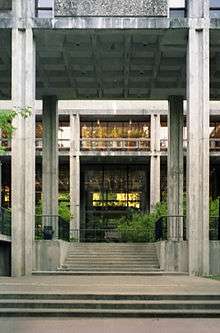History of Consciousness
History of Consciousness is the name of a department in the Humanities Division of the University of California, Santa Cruz with a 40-year history of interdisciplinary research and student training in "established and emergent disciplines and fields" in the humanities, arts, and social sciences based on a diverse array of theoretical approaches.[1] Despite historical issues with budget, program continuity, a program nature that has been described as unorthodox, and challenges in placing its graduates into faculty teaching positions, the program has a history of well-known affiliated faculty and of well-known program graduates.
History
The program was started in the first year of the Santa Cruz campus in a rather informal manner. A small group of faculty members, including the American historian Page Smith,[2] philosopher Maurice Natanson, culture theorist Harry Berger, Jr., and psychology professor Bert Kaplan[3] approached the University of California system-wide Graduate Council with a proposal for a new type of graduate program for the new campus. According to the founding Chancellor of the campus, Dean McHenry, they did not consult with him and the program was approved without his input.[4]
For over a decade, there were no direct faculty appointments to the program and all faculty teaching in the program was done by members of established Boards of Studies (at the time, the UC Santa Cruz equivalent of departments). This led to problems in budgeting and program continuity, and coupled with the unorthodox interdisciplinary nature of the program, it also presented challenges in placing History of Consciousness graduates in teaching jobs. The appointment of Norman O. Brown as Professor of Humanities in 1968 was in part intended to address some of these concerns.[4]
The first graduate student in History of Consciousness was Harvey Rabbin.[4][5] Perhaps the best-known graduate of the program is Huey P. Newton, co-founder of the Black Panther Party. Newton received his Ph.D. in 1980.[6]
Faculty
Historians Hayden White and James Clifford were among the first faculty members directly appointed to the department. White joined the faculty as Professor of History of Consciousness and Chair of the Board in July, 1978, having been recruited by then-Chancellor Angus Taylor to bring stability to the program.[6]
In addition to White and Clifford, Donna Haraway, Fredric Jameson, Teresa de Lauretis, Angela Davis, and Stephen Heath joined the program, while professors in other disciplines taught "HistCon" courses, supervised HistCon graduate students, and participated in new graduate student admissions. Among those most active at this time were political theorists John Schaar, J. Peter Euben, and Robert Meister, as well as philosopher David Hoy. Other notable faculty who have taught in the program: Herbert Marcuse, Gayatri Chakrovorty Spivak, Victor Burgin, Kobena Mercer, Isaac Julien, Karen Barad, and Neferti Tadiar.
As of September 2016, the non-emerita/emeritus members of the department's faculty include Gopal Balakrishnan, Carla Freccero, David S Marriott, Robert Meister, and Eric Porter.[7]
Notable graduates
Notable graduates of this interdisciplinary program include the following:
Further reading
- Brown, J.M. (October 27, 2008). "Angela Davis, Iconic Activist, Officially Retires from UC-Santa Cruz". The Mercury News. Retrieved September 25, 2016.
- Boysen, Ryan (February 2, 2014). "History of Consciousness, Meet Future of Finance". City on a Hill Press. Retrieved September 25, 2016.
See also
References
- ↑ "About the Program". ucsc.edu. Retrieved 25 September 2016.
- ↑ "Page". smithtrust.com. Retrieved 25 September 2016.
- ↑ "In Memoriam-Bert Kaplan". ucsc.edu. Retrieved 25 September 2016.
- 1 2 3 "Dean E. McHenry / interviewed and edited by Elizabeth Spedding Calciano :: UCSC Library Regional Oral History Collection". ucsc.edu. Retrieved 25 September 2016.
- ↑
- 1 2 "Angus E. Taylor : UCSC chancellorship, 1976-1977 : typescript, 1998 / interviewed and edited by Randall Jarrell :: UCSC Library Regional Oral History Collection". ucsc.edu. Retrieved 25 September 2016.
- ↑ "Faculty Directory". ucsc.edu. Retrieved 25 September 2016.
External links
- "UC Santa Cruz - History of Consciousness". ucsc.edu. Retrieved 25 September 2016.
- "University of California, Santa Cruz". ucsc.edu. Retrieved 25 September 2016.
- James, Clifford,; Cameron, Vanderscoff,; Library, Regional History Project, UCSC (7 June 2013). "James Clifford: Tradition and Transformation at UC Santa Cruz". escholarship.org. Retrieved 25 September 2016.
- Staff of UC Santa Cruz (May 1, 2009). "University of California, Santa Cruz Accountability Profile" (report, PDF). pp. 1, 11. Retrieved 25 September 2016. Regarding the perception of the program by its campus administration, as of 2009.
